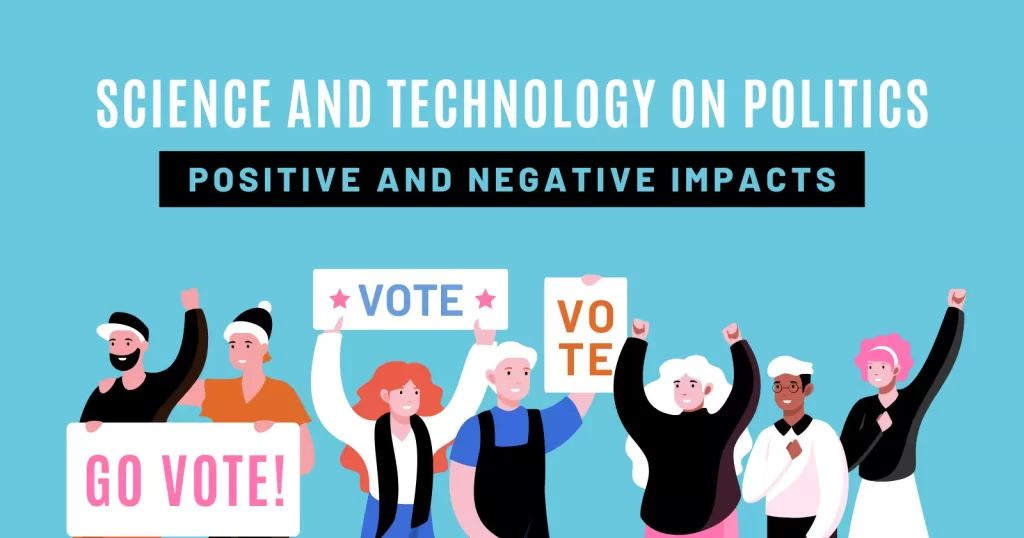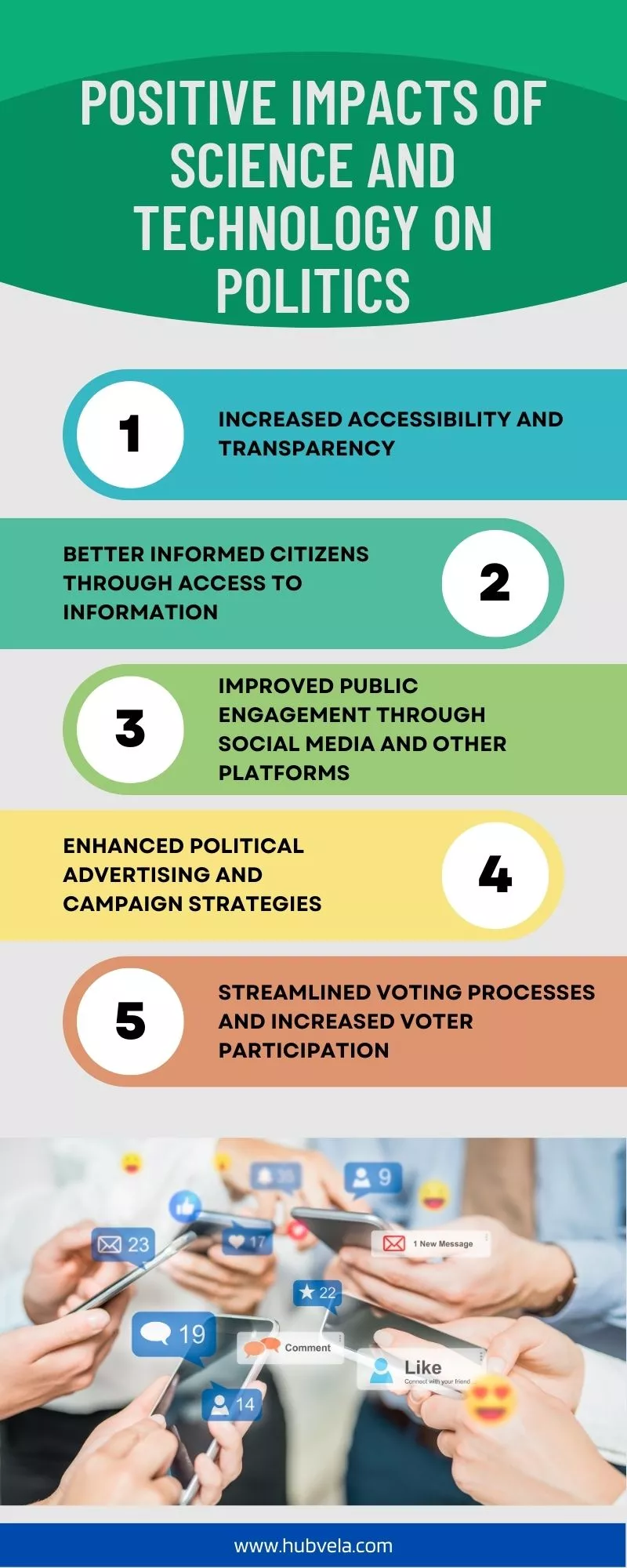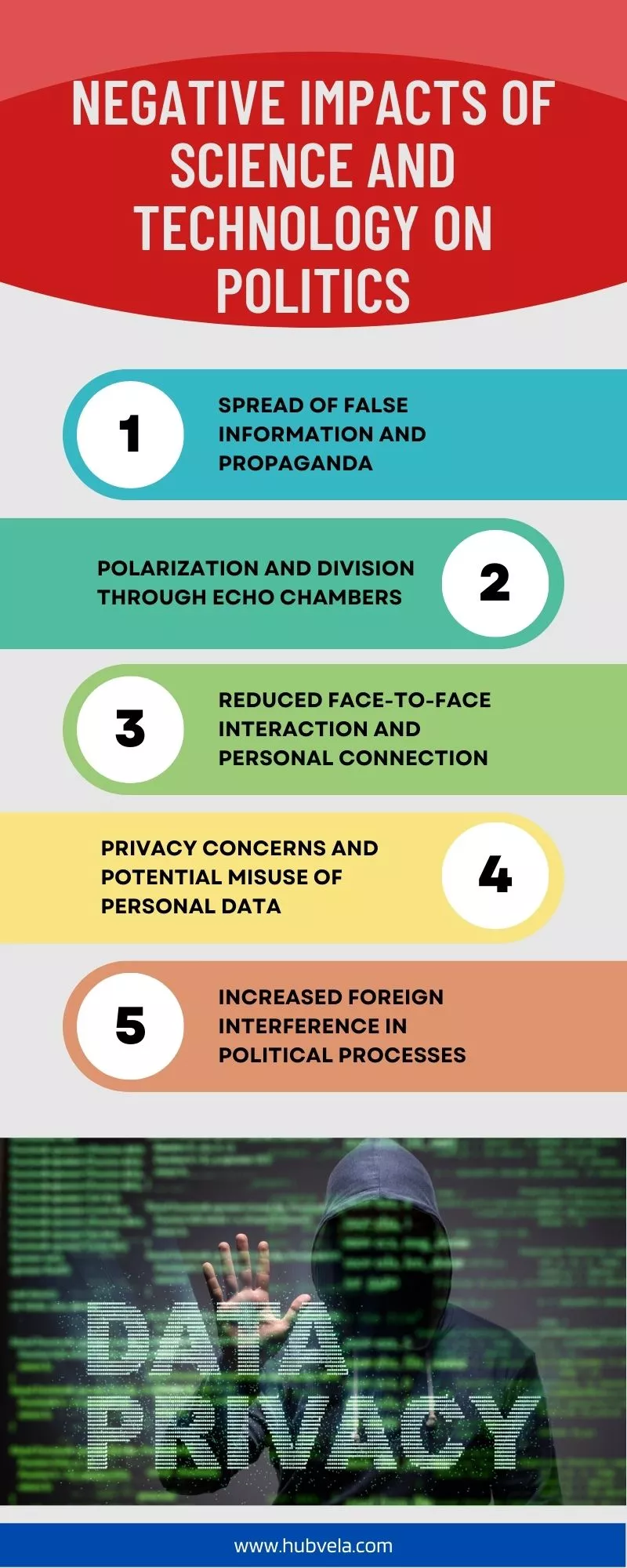In this day and age, the impact of science and technology on the political landscape cannot be overstated. Political agendas are shaped and determined by scientific advancement, and indeed, the modern world is heavily influenced by a range of cutting-edge technologies.
To explore how these dynamics manifest, let us examine both the positive and negative impacts of science and technology on politics more closely.

--Advertisement--
Positive Impacts of Science and Technology on Politics
The 21st century has been a veritable cornucopia of wonders and miracles, with science and technology playing an integral role in the transformation of our societies.
From the dawn of modernity, these twin forces have had a remarkable influence on our politics, stimulating democratic engagement like never before.
The positive impacts of science and technology on politics are myriad – but perhaps most saliently, they enable us to communicate more effectively and efficiently.
Our access to instant news updates from around the world has revolutionized political discourse: we can now react quickly and decisively to shifting climates both domestically and abroad.
Furthermore, social media allows for increased collaboration between citizens which amplifies their collective voices when engaging with politicians; this creates a virtuous cycle whereby governments must become more responsive in order to remain accountable to those they represent.
Let’s discuss some common positive impacts of science and technology on politics.

1. Increased accessibility and transparency
The modern world is experiencing a seismic shift in the way politics and science interact. From increased accessibility to greater transparency, technology has had a positive impact on the way our elected leaders interact with constituents and the public at large.
This newfound connectivity has allowed citizens an unprecedented level of insight into how their government works and has opened up avenues for civic engagement that simply were not available before.
With just a few clicks of their mouse, anyone can access information about their representatives, contact them directly through social media channels, or even get involved in legislative decisions themselves.
In short, technology is transforming politics from a closed-off system to one that is more open and interactive than ever before thanks to its advanced capabilities.
The increasing presence of science and technology in politics is also helping improve trust between citizens and elected officials as it allows for greater accountability when it comes to decision-making processes.
2. Better informed citizens through access to information
In the modern era, access to information has become a crucial element for citizens to stay informed on the issues that matter most to them.
As the capacity for data collection and analysis increases exponentially through technological innovation, citizens are finding themselves becoming more knowledgeable about how government decisions shape their lives.
The dissemination of this critical knowledge is having positive impacts in numerous ways. For instance, with the readily available information at their fingertips, citizens are able to make informed choices when they go to vote or participate in public discourse.
Additionally, those same citizens are now able to actively engage in debates and dialogues related to important political topics.
This increased level of engagement can only lead to better decision-making processes by elected officials as they will have an amplified grasp on what their constituents actually want from them.
3. Improved public engagement through social media and other platforms
As governments around the world are increasingly turning to science and technology to drive public engagement, the positive impacts on politics are undeniable.
From creating transparency in political decision-making processes to connecting citizens with their representatives in a more meaningful way, advances in digital technologies have revolutionized the way we interact with our leaders.
In today’s digital landscape, social media platforms play an important role in amplifying the voices of those who would otherwise go unheard and giving citizens unprecedented opportunities for direct engagement with elected officials.
This has enabled a greater level of public participation in politics, fostering meaningful conversations between lawmakers and constituents that allow for two-way dialogue where ideas can be shared more freely.
Additionally, tools such as online voting systems have made it easier than ever before to increase civic engagement by allowing people to voice their opinions from anywhere at any time.
4. Enhanced political advertising and campaign strategies
The world of politics today is being transformed by science and technology with enhanced political advertising and campaigning strategies taking center stage.
As the race for public office intensifies, so too does the use of data-driven programs, sophisticated algorithms, and other cutting-edge tools to reach voters.
This has allowed for a new level of accuracy in targeting specific demographics and understanding trends in voter behavior.
This has been a boon for politicians looking to increase their visibility, engage constituents, and secure votes.
While there are some negative aspects associated with this development – such as increased manipulation of information or exploiting voting systems – the overall impact on electoral processes has been largely beneficial.
With access to greater amounts of data, candidates can quickly analyze localized issues that are most important to constituents in order to put forward targeted policies that better meet their needs.
5. Streamlined voting processes and increased voter participation
Voting is a cornerstone of democracy and its success hinges on the ease with which citizens can cast their ballots.
However, recently, many elections have been marred by long lines, outdated voting equipment, and complicated registration processes.
Fortunately, the positive impacts of science and technology are helping to streamline the voting process and increase voter participation.
One such development is an online application that allows voters to register remotely from the comfort of their own homes.
This method not only reduces wait times but it also makes voter registration more accessible to those who may be living in remote locations or unable to travel due to disabilities or illness.
Additionally, this application generates an automated reminder for registered voters when it’s time for them to cast their ballots so they don’t forget or miss important elections.
Negative Impacts of Science and Technology on Politics
While some may argue that this has been a net positive for politics, there is no denying that progress in science and technology has also had deleterious effects on the political process.
From the proliferation of disinformation to interference from foreign actors, these negative impacts require serious consideration and attention.
The ubiquity of technology offers unprecedented access to vast amounts of information, yet it also contributes to a culture in which truth is often obfuscated or distorted in order to influence public opinion.
Furthermore, powerful algorithms can be used to target people with manipulatively tailored messages designed to sway them in favor of particular candidates or causes; this represents a gross overstep into an individual’s right to make an informed decision free from extraneous external influence.
Let’s discuss some common negative impacts of science and technology on politics.

1. Spread of false information and propaganda
The proliferation of false information and propaganda in the digital age has had a deleterious effect on politics.
Science and technology have enabled a nefarious cabal to spread their lies far and wide, with little effort required on their part.
This has impacted voters’ decision-making, leading to an overall erosion of trust and faith in democratic systems.
The use of social media platforms such as Facebook, Twitter, and Instagram has been instrumental for political actors to disseminate blatant fabrications masquerading as facts.
These mendacious messages are rapidly amplified by bots or automated software programs simulating human behavior which can be easily purchased online for a nominal fee.
The dissemination of disinformation through these channels is further exacerbated by the lack of proper oversight from regulatory bodies who may struggle to keep up with the rapid pace at which this digital chicanery spreads online.
2. Polarization and division through echo chambers
In recent years, science and technology have had a profoundly negative impact on politics due to the rise of echo chambers and polarization.
These echo chambers serve as ideological bubbles, containing like-minded individuals who self-reinforce their beliefs without considering opposing views.
This has caused significant divisions among political factions, often leading to acrimonious debates and ideological gridlock.
The Internet is a major factor in the proliferation of these echo chambers, allowing people to avoid interacting with opposing political opinions.
Instead of discussing differences in an open forum, users can now retreat into their own digital fortresses of confirmation bias where they are surrounded by views that match their own.
Social media algorithms further contribute to this phenomenon by providing users with tailored news feeds based on what they already like or dislike – a process known as filter bubbles.
3. Reduced face-to-face interaction and personal connection
One negative impact is the dramatic reduction in face-to-face interaction and personal connection between politicians, citizens, and other stakeholders in the political process.
The increasing reliance on digital means of communication has had a profoundly negative impact on the ability of individuals to engage effectively with each other in a meaningful way.
Technology can be an effective tool for connecting people, but it cannot replace the value of physical contact, dialogue, and understanding that comes from real-world meetings between parties.
This deprivation has inhibited our ability to create strong relationships based on trust, collaboration, and respect – all key components necessary for successful politics.
4. Privacy concerns and potential misuse of personal data
As the world advances in science and technology, the potential for misuse of personal data has become a major cause for concern.
This holds especially true in politics, where confidential information is at risk of being misused or exploited. With data from social media platforms, public polls, and other sources increasingly playing an important role in elections, it is essential to consider how best to protect individual privacy.
The negative impacts of science and technology on politics can be far-reaching if not properly monitored.
As more user information is collected and stored online, there are heightened chances of unauthorized access by malicious third parties.
Such activities can potentially lead to the manipulation of election outcomes by various actors with vested interests in seeing certain results come through.
Additionally, the exploitation of personal data could also put individuals at risk as their private details become available to anyone with the right resources or skillset to access them.
5. Increased foreign interference in political processes
The world of politics is increasingly being influenced by the forces of foreign interference. As science and technology become ever more influential in our lives, so too does their impact on political processes.
This has resulted in a significant increase in the amount of foreign involvement in matters related to public policy and decision-making around the globe.
The influx of outside influence raises serious questions regarding the efficacy, integrity, and legitimacy of political systems worldwide.
It can lead to decisions that are not positive for citizens nor reflective of their interests, as well as allowing powerful nations to exert undue influence over vulnerable ones.
Poorly managed foreign interference can also have a damaging effect on global stability and human rights protections – especially since it is often difficult to detect or trace these activities back to their source.
Conclusion on the Positive and Negative Impacts of Science and Technology on Politics
In conclusion, it is clear that science and technology have the potential to revolutionize how governments interact with their citizens.
With the right leadership and responsible use of these tools, societies can benefit from greater transparency, efficient decision-making, and increased public engagement.
However, care must be taken to ensure that these new technological advances are not subject to misuse or manipulation.
Ultimately, it is up to us as citizens to decide if we will harness the power of science and technology for good – creating a brighter future for all.


